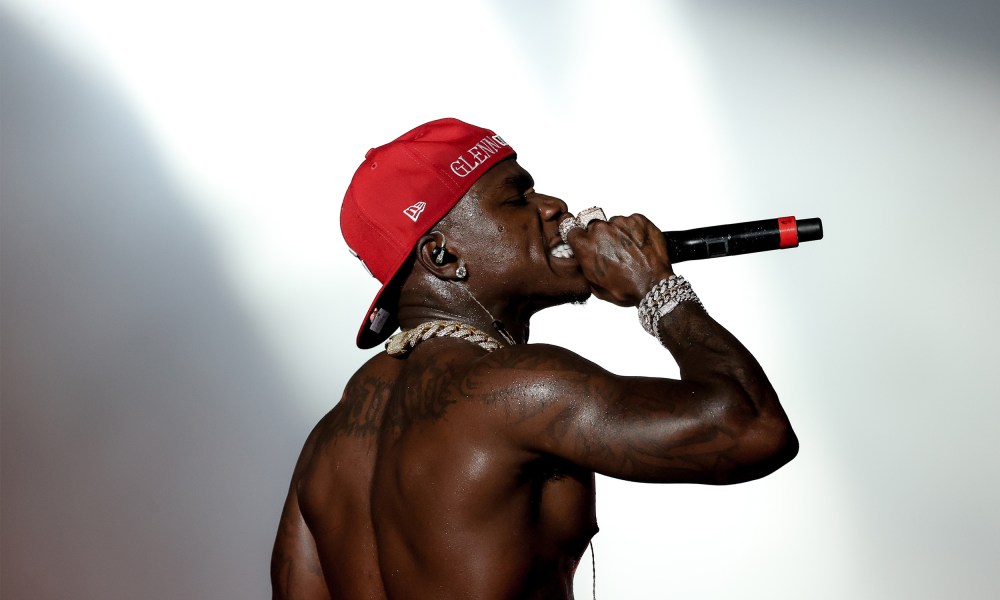Being a fan of American rap music and being openly gay has always been — to put it mildly — incredibly complicated. Last week, rising superstar DaBaby provided me with a perfect reminder of why that’s still the case even now, in 2021.
The rapper — who’s become a household name thanks to songs like “Suge” and features on pop hits like Dua Lipa’s “Levitating” — was riding high when performing at the Rolling Loud Miami music festival. But while finishing up his set, he decided to launch into a wildly unnecessary diatribe that colors exactly why I’m still nervous about going to certain concerts.
“If you didn’t show up today with HIV, AIDS any of them deadly sexually transmitted diseases that’ll make you die in two to three weeks, put your cellphone lighter up,” DaBaby, real name Jonathan Lyndale Kirk, yelled into his microphone. “Fellas, if you ain’t sucking dick in the parking lot, put your cellphone lighter up.”

Again, this was an entirely unprompted rant. Clips of the bizarre moment went viral immediately for obvious reasons: His words were not just slut-shaming, but dangerously perpetuating the idea that HIV/AIDS is something people should be still discriminated against for having — playing into a long history that has led to so much death and violence.
Dua Lipa immediately denounced his statement, saying she doesn’t recognize the person she has worked with. One of the most famous advocates in the fight against HIV/AIDS, Sir Elton John, called his statements “mistruths” and pointed out that these statements only further the stigma that is killing people with HIV everyday.
Cities like Atlanta, where DaBaby’s scheduled performance at the Music Midtown festival was canceled this week, are still seeing 1 of 2 Black men who have sex with men testing positive in their lifetime.
Instead of taking a breath and realizing how wrong he was for those comments, Kirk decided to defend himself the next day by publishing a video on Instagram stating: “My gay fans, they take care of themselves. They ain’t going for that. They ain’t no nasty gay n—–, you know what I’m saying?”
Oh, I know what he was saying. And it meant that this “apology” was trash. It only continued to drive home his original stigma-filled homophobia without him even realizing it, dividing America’s gays into “good” and “nasty.”
What Kirk doesn’t realize is that HIV turned 40 this year, and yet there’s still no real end in sight for when the epidemic will end. Even with the advent of PrEP — an incredibly powerful drug used to block any new HIV infection — we are still seeing the virus impact LGBTQ folks and communities of color at alarming rates. Cities like Atlanta, where DaBaby’s scheduled performance at the Music Midtown festival was canceled this week, are still seeing 1 of 2 Black men who have sex with men testing positive in their lifetime.
It’s not because they are engaging in oral sex in a parking lot, a behavior that is statistically impossible to transmit HIV infections. Instead, the biggest contributor to these statistics is what Kirk himself is perpetuating: stigma.

For many years as a journalist, I traveled around the country meeting HIV-positive people and interviewing them about their lives for the book “When Dogs Heal.” A consistent thread through all of them was the tremendous stigma they faced. Sometimes it was the othering they felt as a gay person leading them to engage in higher-risk behaviors because they didn’t feel comfortable talking to doctors or friends about safer ways to have sex. For others, it was the shame they felt after being diagnosed with HIV that led them to be so isolated and not seek treatment. That only changed when they eventually adopted a dog — the ultimate judgement-free companion — that they all said saved their lives.
What many have told me — and what I personally know to be true as a Black gay man — is that to stop this virus from continuing to ravage communities for another 40 years, we have to stop reducing the people whose lives it impacts to harmful stereotypes about the disease they carry in the ways Kirk did (twice). Instead, we need to talk about sex in ways that don’t make people feel that if they do one thing wrong, then their whole life should be ruined.











